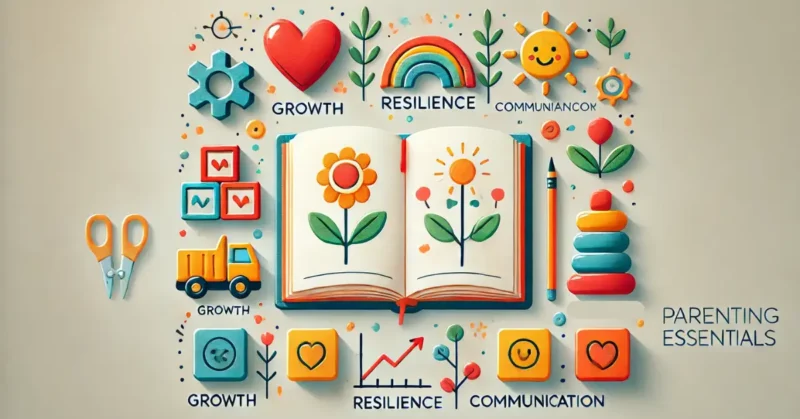Uncover essential parenting tips to raise happy, confident, and resilient kids. Learn positive parenting, emotional regulation, and growth mindset strategies.
Thank you for reading this post, don't forget to subscribe!Raising children is rewarding but can be overwhelming. Every parent wants happy, confident, resilient kids, but the path isn’t always straightforward.
The good news? With the right tips, you can nurture an environment where children thrive emotionally, mentally, and socially.
This guide shares essential parenting strategies informed by research and real-life experience. From modeling positive behavior to teaching emotional regulation, you’ll find practical ways to support your child’s growth.
How Parenting Tips help Matters in Raising Happy Kids
Parents are a child’s first teachers, role models, and emotional anchors. Your communication, responses, and love shape their well-being. Research shows children in supportive homes thrive at school, build healthy relationships, and handle stress better.
When you stay calm during traffic or handle disagreements respectfully, kids learn more from your actions than lectures. Parenting isn’t about perfection—it’s about modeling the values you want to see.
How to Be a Positive Role Model for Your Children
Parenting tips, however, aware parents how they motivate their kids thinking positive.
- Children imitate adults. Your patience, kindness, and problem-solving form their behavioral blueprint.
- Lead with empathy: When you show compassion to others, kids naturally learn to do the same.
- Show stress management: Instead of yelling, take a deep breath and explain your feelings. For example, “I’m upset, so I’ll take a minute to calm down”—this teaches emotional regulation.
- Practice what you preach: If you encourage healthy eating or reading, do it alongside your kids instead of only instructing them.
Showing Unconditional Love and Support as Parenting Tips

Every child needs acceptance and value. Unconditional love gives children the security necessary for confidence and resilience.
- Separate actions from identity: Correct behaviors without labeling your child as “bad” or “naughty.”
- Praise your child’s dedication, even if they don’t score the highest grade.
- Create a safe space: Let them share feelings without fear of criticism. If your child says they fear failing, listen before reassuring.
Building Resilience in Kids Through Parenting
Resilience—the ability to recover from setbacks—is one of the most valuable traits you can nurture.
Encouraging Problem-Solving Skills
Instead of fixing problems, guide your child to think critically. If a toy is lost, ask: “Where did you use it last? Where can we check?” This encourages independence and confidence.
Fostering a Growth Mindset
Teach kids that mistakes are part of success. Research shows that a growth mindset helps persistence and motivation. Celebrate effort and progress, not perfection.
Teaching Kids Emotional Regulation and Confidence
Children struggle with big emotions. Teaching them to manage moods is key to well-being.
Validating Feelings
Simple phrases like “I understand you feel upset” help children feel seen. When children know you respect their emotions, they’re more likely to open up.
Practicing Emotional Regulation
- Demonstrate healthy coping: Deep breathing before responding to anger.
- Drawing or journaling when sad.
- Name emotions instead of suppressing them (“I feel nervous before tests”).
By practicing these techniques together, you teach children lifelong strategies for resilience.
Actionable Parenting Tips for Everyday Life
Parenting goes beyond teaching life’s major lessons. It’s shaped by everyday habits, routines, and small choices that leave a lasting impression on your child’s happiness. Children are observant; they notice patterns.
How you manage daily experiences teaches lessons more impactful than any lecture. When you build consistency, foster open communication, and promote responsibility, you help your child feel secure and confident.
Consistency Builds Security
Children find security in consistency. When they know what to expect, structure is established and boundaries become clear. Whether it’s sharing family meals, following bedtime rituals, or planning weekend activities, these routines create a comforting rhythm.
A set bedtime, such as 9 pm, helps your child’s body and mind adjust, making sleep easier and nightly resistance less likely. Clear limits on screen time cultivate accountability. When rules remain steady, regardless of your mood, children test boundaries less. Yet, consistency doesn’t demand rigidity—it’s about creating routines your child can depend on, fostering a sense of safety.
Encourage Open Communication
Strong parent-child relationships are built on open communication. When children feel heard, they trust you enough to share struggles—be it school stress, friendship issues, or personal fears. Practice active listening by setting aside distractions, maintaining eye contact, and repeating back their words so children know you understand them.

If your child says, “Nobody wanted to play with me at recess,” respond, “That must have felt lonely. Do you want to talk about it?” This validates their feelings and shows their emotions matter. Open conversations build confidence and teach clear expression.
Promote Freedom and Responsibility
Raising confident children means giving them chances to choose and learn. Age-appropriate responsibilities build independence and problem-solving.
Younger children might choose between two snacks or help set the dinner table. In contrast, older kids and teens may manage their pocket money, plan a weekend activity, or pack their school bag. As children make their own decisions, they experience the pride of success as well as the valuable lessons mistakes provide.
If your teen overspends their allowance, let them experience having no money until next time. This teaches resilience, accountability, and life skills.
Additional Everyday Parenting Tips
- Bond with family through nightly “highs and lows” at dinner—sharing the best and hardest parts of the day deepens connections.
- Model Gratitude: Saying “thank you” to your child when they help out teaches respect and appreciation.
- Stay present with your child. Even a short, ten-minute period of fully engaged play—free from phones or distractions—means more than hours spent half-attentive.
- Cook together, take family walks, or read at bedtime. These routines strengthen physical health and emotional security.
Ultimately, daily parenting shapes your child’s growth most profoundly, not by grand gestures, but by the small, steady signals of love, stability, and respect. With routines, open conversations, and shared responsibilities, you help your child become confident and resilient—ready to face the world.
FAQs on Parenting Tips
Q. What are 5 Strategies for Raising Happy Kids?
- Show unconditional love.
- Foster a growth mindset.
- Teach emotional regulation.
- Encourage independence.
- Maintain consistency in rules and routines.
Q. What are the 5 Secrets to Raising a Happy Child?
- Practice active listening.
- Spend quality time together.
- Use positive reinforcement.
- Set healthy boundaries.
- Model positivity and optimism.
Q. Why is Positive Parenting Important?
Positive parenting creates a nurturing environment where children feel loved, respected, and valued. Encouragement, rather than punishment, builds self-esteem and a strong sense of identity. This approach fosters emotional intelligence, teaching children to recognize and regulate feelings.
Research shows that supportive households raise resilient children who handle stress well. Positive parenting also strengthens the parent-child bond, encouraging trust and open communication. This foundation helps children develop healthier friendships and social skills, setting them up for lifelong confidence and well-being.
Q. How Does Negative Parenting Affect Child Growth?
Hostile parenting—marked by harsh discipline, constant criticism, or neglect—can harm a child’s emotional development. Children in such environments struggle with low self-worth and may feel they are “never good enough.” This can cause anxiety, depression, or anger issues.
Studies suggest that hostile or inconsistent parenting weakens a child’s sense of safety. As a result, they may struggle to form trusting relationships. Hostile parenting also limits problem-solving skills, since unsupported children avoid challenges. Over time, it can hinder emotional growth and social competence, creating barriers in adulthood.
Conclusion on Parenting Tips
Raising happy, confident, resilient kids isn’t about strict formulas—it’s about patience, love, and consistency. By modeling positive behavior, validating emotions, fostering resilience, and encouraging communication, you give your child a strong foundation.
The small choices you make—listening, celebrating effort, setting boundaries—shape your child’s future. Parenting is about learning, growing, and connecting. Use these essential tips to guide your children toward a happier, healthier, more confident life.
Have you experienced any unique tips? Must share with us, please!
Read more articles about Health & Wellness Tips.
You might like to read:

